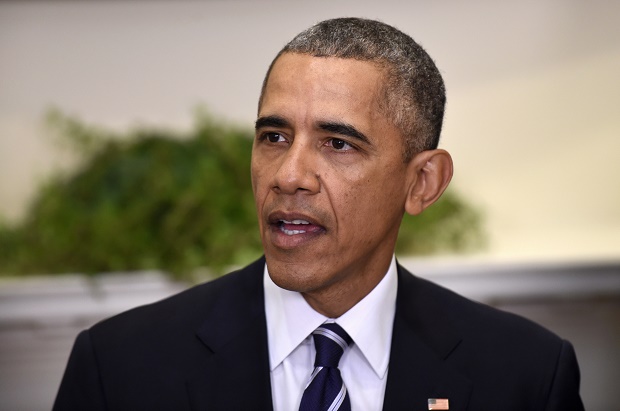Conservatives at odds with Obama, science on climate

In this Nov. 6, 2015, file photo, President Barack Obama speaks in the Roosevelt Room of the White House in Washington. AP File Photo
WASHINGTON, United States—US conservatives backed by the powerful gas and coal lobbies are at loggerheads with both the scientific world and President Barack Obama on the environment—but have failed to block his path on climate change.
READ: FULL TEXT: President Obama’s speech, dialogue at Apec CEO Summit
Among them are several Republican White House contenders, who deny or downplay the impact of humans on global warming and reject efforts to reduce greenhouse gases, saying it could hurt the economy and favor China, the world’s top carbon dioxide emitter ahead of the United States.
They are joined in Congress by Republican chairmen of key science-related panels, including Senator Jim Inhofe, an arch-conservative who heads his chamber’s Environment and Public Works Committee and for whom climate change is “the greatest hoax ever perpetrated.”
READ: Obama pushes climate change pact
Article continues after this advertisement“In terms of democracy, I think it’s been terribly detrimental, because people now feel unable to judge the evidence before them,” Naomi Oreskes, a professor at Harvard University, told AFP.
Article continues after this advertisement“A great deal of what should be meaningful public debate has been reduced to ‘He said, she said, who the heck knows?’ The idea that scientists are our reliable experts on matters of science has been deeply undermined.”
Inhofe’s committee adopted a measure that prevents the Environmental Protection Agency from applying new standards aimed at reducing carbon dioxide emissions from coal power plants. It was endorsed by the full Senate and the House is soon expected to vote on a similar measure, although Obama’s veto is already clear.
A recent study by the Pew Research Center noted that American climate change views were sharply divided along partisan lines, with Democrats “much more likely than Republicans to see climate change as a problem, to believe its effects are being felt now, to think it will harm them personally, and to support US participation in an agreement to limit greenhouse gas emissions.”
A YouGov poll published this month showed that just one third of Republican voters believe the world’s climate is changing as a result of human activity, compared to 82 percent of Democrats.
Undermining scientific foundations
Federal laws such as the Clean Air Act, adopted in the 1970s, have a solid scientific basis but are now being “perceived as inconvenient and expensive by some corporate actors,” said Andrew Rosenberg, director at the Center for Science and Democracy.
“Consequently, Congressional leaders are pressured to render these long-standing and well regarded laws ineffective by undermining their scientific foundations,” he wrote in an editorial published in the journal Science.
In another move, Lamar Smith, a Republican lawmaker from Texas who heads the House Science, Space and Technology Committee, wants to reduce, by 40 percent, space agency NASA’s budget for an area that encompasses climate research.
“Unfortunately, very few of my conversations in Congress resolve around evidence,” said Rush Holt, chief executive officer of the American Association for the Advancement of Science and executive publisher of the Science family of journals.
“It’s partly because most people and most members of Congress think that science is technology, they don’t think of it as gathering and evaluating evidence,” added the former Democratic congressman.
For Oreskes, co-author of a book that draws parallels between the tactics of climate skeptics and those of tobacco companies to undermine the science on dangers of smoking, this anti-science war has its origins in an “extreme neo-liberal agenda that rejected a positive role for governance” embraced by the Republican party in the 1980s, led by Ronald Reagan.
Reagan was elected president on the theme that government was more of a problem than a solution.
This school of thought has in recent years benefited from an unlimited flow of money from powerful lobbies and wealthy donors such as the brothers Charles and David Koch, whose fortune is linked to oil. They are behind the election of arch-conservatives in Congress and finance the Heartland Institute, which spearheads the effort to deny global warming.
Shift over time?
Still, even the stances of the most hardline Republicans on the subject could evolve over time, said Alden Meyer, director of strategy and policy for the Union of Concerned Scientists.
“My assumption is that eventually Congress is going to respond to public opinion, which is getting stronger and stronger in support of actions,” he told AFP.
“So I would imagine five years from now you won’t see the kind of resistance and denial about the reality of the problem that you see today in the Congress, I think this is going to change.”
Meyer said he was already noticing a change at the local level, where both Democratic and Republican mayors are expressing similar concern about the risk of coastal flooding linked to global warming.
“Mayors are on the frontline and they have to deal with reality… and you see more and more business leaders coming out and taking action and making commitments to fight climate change,” he said.
“I think over time the Republican party and Congress will shift on this.”